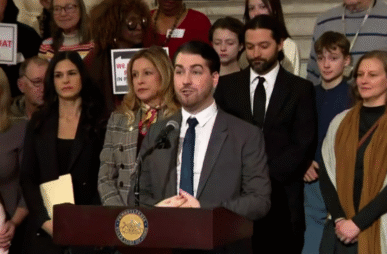Florida tests show pesticide in popular breads
Florida officials this week unveiled test results showing multiple breads commonly sold in grocery stores contained residues of glyphosate weed killer, a chemical scientists have linked to cancer.

Florida officials this week unveiled test results showing multiple breads commonly sold in grocery stores contained residues of glyphosate weed killer, a chemical scientists have linked to cancer.

Following years of inaction on the Clean Water for Iowa Act, one lawmaker is looking to advance several smaller bills that would improve monitoring and strengthen permit requirements for large industrial farms.

Advocates for human health and the environment are pushing back against a Florida farm bill that would punish the spread of “false information” about agriculture, decrying a measure they say violates free speech rights and silences public debate about harmful farming practices.

A contingent of Pennsylvania lawmakers and Parkinson’s disease research and support groups on Wednesday called for the state to move quickly to ban paraquat, a weed killing chemical commonly used by farmers that scientific research links to the incurable brain disease.

In a move that reflects mounting US opposition to a class of harmful insecticides linked to environmental and human health risks, Colorado lawmakers last week introduced a bill to curb the use of neonicotinoids.

Three years ago Chris Jones was a highly regarded research engineer at the University of Iowa, where he directed stream pollution monitoring work and published details about the state’s dismal water quality in peer-reviewed scientific journals. Jones also authored a university-sponsored blog, where he regularly identified agriculture as the primary source of the state’s calamitous water pollution.

On the eve of the opening of what would have been a bellwether US trial over allegations that a widely used weed killer causes Parkinson’s disease, paraquat-maker Syngenta reached a settlement with the retired landscaper who blamed the company for his diagnosis with the incurable brain disease.

A trial with nationwide implications is set to open Wednesday in Philadelphia pitting a retired landscaper suffering from Parkinson’s disease against the multinational agrochemical company Syngenta over accusations that the company’s paraquat weed killing products cause the incurable brain disease.

A leading European chemical safety institute has fired the director of its cancer research center after the director led an extensive testing program into the safety of the pesticide glyphosate, sparking concerns about chemical industry influence into what has been an independent research institution.

The US Department of Agriculture (USDA) is pausing a loan program aimed at promoting anaerobic digesters — many of which are issued for large-scale farms that turn animal waste into gas — to investigate high loan delinquency rates and underperformance.